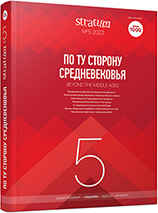Лев VI и вызовы ислама. (Размышления по поводу книги: M. L. D. Riedel. Leo VI and the Transformation of Byzantine Christian Identity. Writings of an Unexpected Emperor. Cambridge, 2018)
Leo VI the Wise and Islam Challenges. (Reflections on the book: M. L. D. Riedel. Leo VI and the Transformation of Byzantine Christian Identity. Writings of an Unexpected Emperor. Cambridge, 2018)
Author(s): Irina Yu. Vascheva, Vera A. GrozovaSubject(s): History, Review, Military history, Political history, Middle Ages, 6th to 12th Centuries, History of Islam
Published by: Издательский дом Stratum, Университет «Высшая антропологическая школа»
Keywords: Meredith Riedel; Leo VI the Wise; Christianity; Byzantine; religious identity; “Tactica” of Leo the Wise; Abbasid Caliphate;
Summary/Abstract: This article examines a range of problems related to the formation of the military-political doctrine of the Byzantine Empire in the X century and the role of the Byzantine Emperor Leo VI the Wise in these events. The impetus for the appearance of this article was the publication in 2018 of M. Riedel’s monograph ‘Leo VI and the Transformation of Byzantine Christian Identity’ (Riedel M. L. D. Leo VI and the Transformation of Byzantine Christian Identity. Writings of an Unexpected Emperor. Cambridge, 2018). The monograph is distinguished by a non-standard approach to the writings of the Byzantine emperor, the desire to study them together in order to discover the idea that unites them all. The author, indeed, manages to show how, with the help of the religious idea, Leo VI the Wise builds a completely new military-political doctrine of the Byzantine Empire and responds to the challenges of modernity. The monograph shows that the problem of the relationship between the Christian and Muslim worlds, considered in the categories of “us” — “them”, is relevant not only for the era of the Crusades, but manifests itself much earlier, shows the need to study these images, special vocabulary, mental stereotypes, etc. Therefore, this monograph can be the beginning of a whole trend in modern Byzantine studies. At the same time, the authors point to a number of aspects which are addressed only in part or not dealt with at all by the British researcher, while their study could contribute to a more comprehensive understanding of Leo the Wise’s personality and his reign.
Journal: Stratum plus. Археология и культурная антропология
- Issue Year: 2022
- Issue No: 5
- Page Range: 435-446
- Page Count: 12
- Language: Russian

